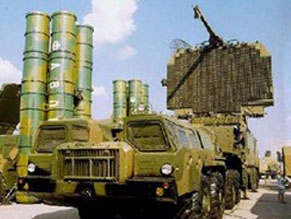|
World Jewish News

S-300
|
Despite Netanyahu pressure, Russia defends Iran missile deal
15.02.2010, Israel and the World On the eve of Prime Minister Benjamin Netanyahu's visit to Moscow, senior Russian security officials were speaking out on defense-related issues that have provoked tensions between the two countries.
An hour before Netanyahu's plane took off on Sunday, Russian officials said that Moscow sees no reason to delay the sale of the S-300, a powerful air-defense system, to Iran. In addition, on Friday, Russian intelligence officials leaked comments expressing their displeasure with plans by an Israeli firm to close a major arms deal with Georgia.
"There is a signed contract [for the S-300 missiles] which we must follow through on, but deliveries have not started yet," Vladimir Nazarov, deputy secretary of Russia's Security Council secretary, told Interfax news agency in an interview. "This deal is not restricted by any international sanctions, because we are talking about deliveries of an exclusively defensive weapon."
Nazarov added that a military strike on Iran would be a big mistake and that the problems linked to Tehran's nuclear program must be resolved by diplomatic means only.
"Any military action against Iran will make the situation explode and will have extremely negative consequences for the entire world, including for Russia, which is a neighbor of Iran," he noted.
Israel has expressed concern in the past over Russian plans to sell Iran the S-300 system, which will be used to defend its nuclear installations against a possible attack. During the past two years, both Israel and the United States have pressured Russia not to implement the agreement with Iran, and there may be other opposition, according to sources in the premier's entourage.
Netanyahu is expected to raise the subject of the arms sales to Iran in meetings with Russian President Dmitry Medvedev and Prime Minister Vladimir Putting. In recent months Russia had promised not to go through with the deal. However, the economic crisis and pressure from the military establishment have resulted in major disagreements within the country's leadership on the issue.
Medvedev recently told President Shimon Peres and Foreign Minister Avigdor Lieberman that Russia needs the revenue from the deal and suggested that a different buyer be found.
Netanyahu plans to tell his Russian hosts that Moscow must take an active role in halting Iran's nuclear program.
"We will discuss a broad spectrum of issues, first and foremost the Iranian issue," he said. "Israel believes that Iran must come under serious pressure, first very strict sanctions, which Secretary of State [Clinton] described as paralyzing."
Russia's declarations about the S-300 system were also meant to send a message to Israel that it does not approve the resumption of its arms sales to Georgia, which were frozen in August 2008.
According to the Russian government news agency, Itar-Tass, Israel resumed the sale of arms to Georgia and "is no longer limiting itself to the sale of UAVs [drones]," which are perceived to be defensive weapons.
A Russian intelligence source was quoted as saying that a private Israeli firm is providing weapons to the Georgian armed forces .
Specifically, according to the Russian news agency Ropadia, a company registered in Cyprus signed a contract for the delivery of 50,000 Kalashnikov assault rifles, 1,000 RPG launchers, and 20,000 40mm shells for the rocket launchers, in addition to 15,000 assault rifles of different types. The report stated that the arms deal was also carried out through Arsenal, a Bulgarian firm.
Foreign Ministry sources did not confirm the reports, but said that the timing of the leak to Itar-Tass is not coincidental and it appears that certain figures in Russia wish to link the arms sales to Georgia with Israel's demand for a freeze on the S-300 deal to Iran.
Sources at the ministry confirmed that security ties with Georgia were recently resumed, but they involve provision of basic training for the Georgian army by Israeli firms.
Haaretz.com
|
|
